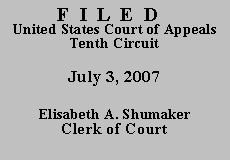 UNITED STATES COURT OF APPEALS
UNITED STATES COURT OF APPEALS
 UNITED STATES COURT OF APPEALS
UNITED STATES COURT OF APPEALS
| JEFFREY JON PEVEHOUSE, | |
| Petitioner-Appellant, | |
| v. | |
| JOSEPH SCIBANA, | |
| Respondent-Appellee. |
Reviewing de novo, see Patterson v. Knowles, 162 F.3d 574, 575 (10th Cir. 1998), we affirm. Petitioner received credit on his state sentence for all of the time between March 13, 2001, and November 13, 2001, when his federal sentence commenced. A federal prisoner is only entitled to credit for time spent in official detention prior to commencement of his federal sentence if that time has not been credited against another sentence. 18 U.S.C. § 3585(b); see also United States v. Wilson, 503 U.S. 329, 337 (1993); Weekes v. Fleming, 301 F.3d 1175, 1179 (10th Cir. 2002). Therefore, Petitioner is not entitled to federal sentence credit for the time credited to his state sentence.
As for Petitioner's argument that § 3585(b) is unconstitutional, the district court correctly held that he had waived this argument by failing to raise it before the magistrate. See Marshall v. Chater, 75 F.3d 1421, 1426 (10th Cir. 1996). Accordingly, we AFFIRM the district court's dismissal of the action. Petitioner's motion for leave to proceed in forma pauperis is GRANTED.
Entered for the Court
Monroe G. McKay
Circuit Judge
Click footnote number to return to corresponding location in the text.
*. This order and judgment is not binding precedent, except under the doctrines of law of the case, res judicata, and collateral estoppel. It may be cited, however, for its persuasive value consistent with Fed. R. App. P. 32.1 and 10th Cir. R. 32.1.
After examining the briefs and the appellate record, this panel has determined unanimously that oral argument would not be of material assistance in the determination of this appeal. See Fed. R. App. P. 34(a)(2); 10th Cir. R. 34.1(G). The case is therefore ordered submitted without oral argument.